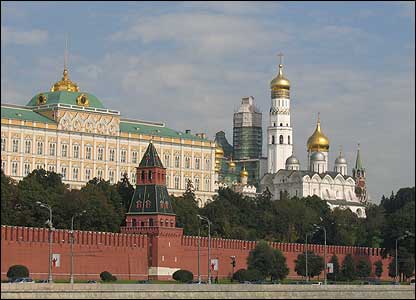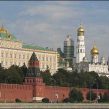
RUSSIA FORCING OSCE OUT OF ELECTION OBSERVATION ROLE
Publication: Eurasia Daily Monitor Volume: 4 Issue: 202
By:

Russia has disabled the Organization for Security and Cooperation in Europe from observing Russia’s parliamentary elections. Ahead of the December 2 vote, the OSCE has yet to be admitted to Russia to observe the electoral campaign. And when the observation mission will finally be allowed in, its Moscow-dictated size and operating modalities will reduce that mission to a meaningless role.
Election observation is the one remaining meaningful activity of the OSCE and its specialized agency, the Office of Democratic Institutions and Human Rights (ODIHR). If deprived of this role in Russia and the countries that follow Moscow’s line on this issue, the OSCE would lose a major raison d’etre. The Kremlin does not intend to kill the organization, but rather to weaken it decisively and dominate it afterward.
On October 30 the chairman of Russia’s Central Electoral Commission (CEC), Vladimir Churov, announced that up to 400 foreign observers would be invited to observe the elections; and of that total, only 50 observers would be accepted in the OSCE/ODIHR mission. Invitations were sent out on October 30, thus making it impossible for the OSCE/ODIHR to perform its normal long-term observation function ahead of the voting.
The remaining 350 invitations are being sent to the Parliamentary Assembly of the Council of Europe (PACE), the Commonwealth of Independent States (CIS) Inter-Parliamentary Assembly, the central electoral commissions of several CIS member countries, the Shanghai Cooperation Organization, several West European countries, and for some reason the Jordanian electoral commission (Itar-Tass, October 30).
Russia’s 2003 parliamentary elections were monitored by a total of 1,165 foreign observers, including 450 from the OSCE (nine times more than now). And they received the invitations in mid-September that year, almost three months ahead of the December 9, 2003 poll (Moscow Times, October 26; Interfax, October 30).
In a little noticed but significant detail, Churov listed PACE in first place on the list of accredited organizations and OSCE/ODIHR last. This order may signal a more lenient treatment of PACE for its complacency about Russia’s non-fulfillment of membership commitments and the deal to elect Kremlin-affiliated Mikhail Margelov as PACE president as of January 2008. The Kremlin seems to be more concerned about OSCE/ODIHR. In recent years, OSCE/ODIHR and PACE have conducted joint election observation missions in a number of countries. Whether they would do so in the upcoming Russian election is unclear.
The NGO Golos, one of Russia’s leading election-monitoring groups (funded by the European Commission and USAID), points out, “400 foreign observers is a very low figure for Russia[‘s] huge territory and 95,000 polling stations”; and, furthermore, “The delay in sending invitations is a major problem. Campaign monitoring is particularly important because most violations usually take place during the campaign.” Moreover, Russian NGOs are no longer allowed to send observers to polling stations (Interfax, October 30).
Russia had announced these intentions on September 18 in a detailed document at OSCE Vienna headquarters. The gist of the proposal was endorsed by several countries at the CIS summit on October 5 in Dushanbe. Apart from restricting the OSCE/ODIHR mission to 50, Russia’s document defines “Basic Principles of ODIHR Monitoring of National Elections.” The principles and modalities include, inter alia:
limiting the number of OSCE/ODIHR observers to a maximum of 50 in any given national election, with no more than 5% of from any one country;
delaying any public assessment of the freedom and fairness of the elections until after the country’s authorities have officially announced the final returns;
making the content and publication of the assessment subject to authorization by the OSCE Permanent Council (where Russia wields veto power);
monitoring elections not only in post-Soviet countries but also in Western ones (a tactic to disperse OSCE’s limited budgetary resources);
appointing more senior staff and monitors from Russia and its CIS allies to ODIHR and the OSCE/ODIHR election observation missions.
The organization blundered as usual under Russian pressure. It kept the situation under wraps and tried to negotiate non-transparently with Moscow under duress, instead of exposing the situation for public opinion. The Russian document was available on the organization’s internal, restricted-access website, but the OSCE did not show it to the media, thus forfeiting the chance to generate countervailing pressure on Russia. The organization’s chairman-in-office, Spanish Minister of Foreign Affairs Miguel Angel Moratinos, and other OSCE officials embarked on hopeless discussions with Russia for a solution.
Only in late October did the Russian document somehow leak to the media, and a very few OSCE officials finally spoke. ODIHR Director Christian Strohal termed Moscow’s redefinition “not a definition but a deconstruction” of principles and of ODIHR’s decade-long work,” and a former OSCE Parliamentary Assembly chairman, Bruce George, described Moscow’s move as “part of an overall strategy to emasculate ODIHR” (New York Times, October 25).
Belarus, Armenia, Kazakhstan, Kyrgyzstan, Tajikistan, and Uzbekistan joined Russia in promoting these proposals at the OSCE. Armenia is headed for a presidential election in early 2008. Kazakhstan, which held a presidential election this year, has almost certainly forfeited its aspiration to chair the OSCE in 2009 by rallying to this Russian move.




